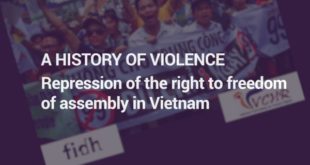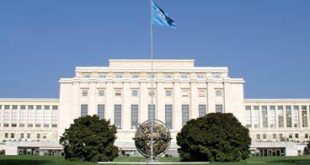ASEAN People’s Forum, Jakarta 3-5 May 2011
VIOLATIONS OF FREEDOM OF EXPRESSION
AND RELIGIOUS FREEDOM IN VIETNAM
VO TRAN NHAT
Vietnam Committee on Human Rights &
Que Me: Action for Democracy in Vietnam
Thank you for giving me the floor.
I am speaking on behalf of the Vietnam Committee on Human Rights and the FIDH, the International Federation of Human Rights of which we are a member.
I want first to say that the very fact that I am here at this ASEAN People’s Forum today is proof of the importance of civil liberties and democracy. Last year, when the APF was held in Hanoi, my Committee was not allowed to attend. We were even banned from holding a Press Conference in Thailand under pressure from Vietnam. In addition, two members of the FIDH who had registered for the Forum were banned at the last minute, just because my Committee is their member. One person had the visa torn from her passport by the Vietnamese Embassy in Paris.
Many of you who were in Hanoi witnessed the Forum’s lack of independence, and even made a formally protest against the interference of the government in this civil society event which undermined the principles of the ASEAN Charter.
This year, with Indonesia in the ASEAN Chair, things have changed. Although ASEAN is still what it is, civil society from all over the region can gather here and formulate concerns. This is a tribute to Indonesian democracy, but also to the strong and dynamic civil society in Indonesia which does not accept to be manipulated or silenced. What is happening here today could not – and did not – happen in Vietnam.
I appreciate this opportunity to talk about Vietnam because I think that Vietnam’s problems are not well known, even amongst ASEAN civil society. Human rights abuses in Burma or China are well reported, but somehow Vietnam’s are overlooked. The media speaks only of Vietnam’s economy. The travel brochures only mention Vietnam’s tourist attractions; nice people, great landscapes, good food. I must admit, this last part is true!
But there is a dark side. Vietnam is also a totalitarian country where poverty and repression are widespread. Economic liberalization without civil liberties has led to massive corruption, social injustice and a rocketing wealth gap between the ruling elite and the rural poor. The government claims to have reduced poverty, but this is far from true. Vietnam’s poverty line is just US$18 per month. Anyone earning over that is not classified as “poor”.
As the government opens the economy, it is closing the door on political reforms. Peaceful calls for human rights and democracy are seen as “national security threats” or attempts to overthrow the regime. The government’s paranoia is growing with the fast spread of new IT technology, the Internet and Blogs. Today, Vietnam is the world’s second largest prison for “netizens” according to media monitors.
Why is it that Vietnam’s abuses escape attention? Firstly, because Vietnam’s leaders are propaganda experts. To present a “human face” and win international trade and aid, they have devised “two-track” policies. One track is “for export only”. The other is for “domestic consumption”. One praises human rights abroad, whilst the other ruthlessly suppresses them at home.
Secondly, Vietnam’s policies are increasingly sophisticated. Instead of holding large-scale crack-downs that attract bad publicity, Vietnam uses tactics of isolation, harassment, house arrest and surveillance to silence dissent. Critics not only face repression themselves, but for their whole families– wives cannot find work, children are expelled from school. It has created a climate of fear, in which only the bravest dare speak out.
The most blatant example of these “two-track” policies is that of religious freedom. Let me take the case of Vietnam’s largest religion, Buddhism, and repression of its largest body, the independent Unified Buddhist Church of Vietnam (UBCV).
After Vietnam was united at the end of the Vietnam War, the government tried to suppress the UBCV by force, arresting and even murdering its leaders, forcing monks to enter the army and confiscating its property. When this policy failed, it decided to place Buddhism under control. A State-sponsored Buddhist organization was set up in 1981 and the UBCV was banned. Since then, the government has waged a systematic campaign against the UBCV, harassing, detaining and intimidating its followers. UBCV leader Thich Quang Do is under house arrest at the Thanh Minh Zen Monastery in Ho Chi Minh City – which we call Saigon – simply for his peaceful advocacy of religious freedom and human rights.
A “religious police force” controls and represses Buddhist activities. My Committee has obtained a copy of a 600-page instructional manual, printed in one million copies, which trains religious police to (I quote) “struggle against religions” and promote “Buddhism with Socialist orientations”. Today, thousands of police disguised as monks have infiltrated UBCV pagodas where they keep watch on all the activities of the monks and followers.
Yet at the same time as it represses the Buddhists, Vietnam is using Buddhism to enhance its international image. At the Party’s behest, rich entrepreneurs are pouring money into the construction of massive Buddhist pagodas, such as the Bai Dinh Pagoda in Ninh Binh. Spectacular Buddhist festivals have been hosted by the government, such as the UN Vesak Day in 2008, to which thousands of international guests were invited. But even as these celebrations take place, state repression continues against the UBCV.
Religious freedom is important everywhere, but in Vietnam it is truly the key to democratization. Today, the religious movements are the only independent voices of civil society. The UBCV calls not just for religious freedom, but for all human rights for all. Thich Quang Do has launched appeals for democracy, denounced the risks of bauxite mining in the Central Highlands, supported farmers and peasants protesting state confiscation of lands. These are issues that must be addressed, and Vietnam cannot ignore them by shooting the messengers and silencing the UBCV.
We call on Vietnam to cease these flagrant abuses of freedom of expression and religion, and we urge ASEAN member states to:
– Encourage Vietnam to take necessary measures to promote and protect the fundamental freedoms and rights of its people;
– Use the AICHR and the ASEAN Commission for the Promotion and Protection of the Rights of Women and Children (ACWC) as the primary platforms to engage Vietnam in a genuine dialogue on the human rights violations occurring in the country; and
– Seek, per the terms of reference of the AICHR, to obtain information from Vietnam on the promotion and protection of human rights in the country.
Thank you.
 Quê Me Quê Me: Action for democracy in Vietnam & Vietnam Committee on Human Rights
Quê Me Quê Me: Action for democracy in Vietnam & Vietnam Committee on Human Rights



